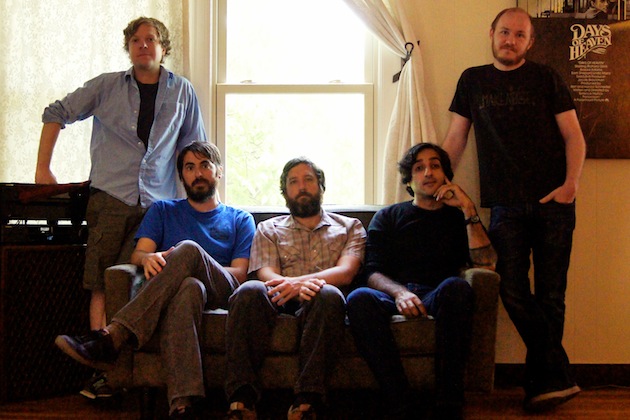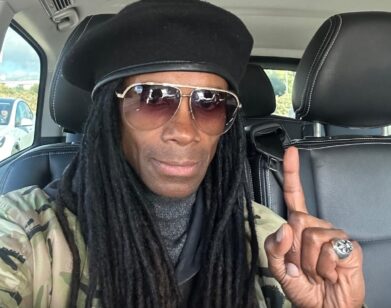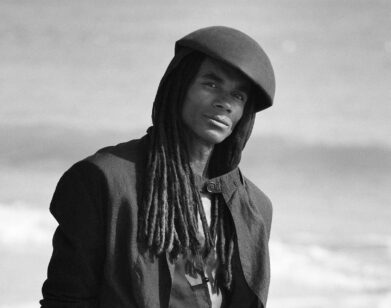Explosions and an Avalanche

ABOVE: DAVID WINGO (CENTER) AND EXPLOSIONS IN THE SKY
Explosions in the Sky, the purely instrumental quartet from Austin, Texas—well known for their emotionally epic and anthemic songs featured on Friday Night Lights—can, in eight minutes (the average length of a track), effortlessly weave from sensitive serenity and suspenseful struggle to cinematic positivity. They have a knack for creating the same kind of immersive and imaginative experiences you thought only existed in the scenes of your favorite movies.
This is exactly what the band did for David Gordon Green‘s latest project, Prince Avalanche, a loose remake of an obscure 2011 Icelandic film Either Way, which sees Paul Rudd and Emilie Hirsch paint traffic lines on a remote stretch of road in Texas that cuts through a recently fire-ravaged forest. Explosions in the Sky, with the help of composer David Wingo, interprets the film’s melancholic humor to create a raw, 15-track score that perfectly captures the characters’ internal and external struggles, as well as Prince Avalanche’s isolated setting.
We spoke with guitarist Mark Smith, as well as Wingo, about working on the film, out today; the band’s upcoming seventh album, a follow-up to 2011’s Take Care, Take Care, Take Care; and how they feel about touring with Nine Inch Nails this fall.
OLIVIA FLEMING: It’s been nine years since you guys first did the soundtrack for Friday Night Lights, how have you changed, or stayed the same?
MARK SMITH: We’re pretty much the same people, with some small but important changes. I think we’ve grown a lot musically in that we know a lot more about what we want and how to get there, and can think in broader terms about what is possible and how to bring out certain tones, feelings, and themes in new ways. When we did Friday Night Lights, we had kind of just honed our sound into something totally us—reverbed melodic guitars and marching drums—and it really worked for that in particular. But it wasn’t exactly a diverse or varied sound at that point. Now I think we are able to draw upon a much greater appreciation and knowledge for how to approach music for the screen. We have gained a lot of tools and knowledge and sense of possibility, and I think we want to do the same things—enhance each scene with whatever tone or emotion or subtlety in a way that helps the film—but we want to do it in more unexpected ways, with a far more diverse palette. I guess I just hope we continue to grow and experiment while staying true to who we are.
FLEMING: For Prince Avalanche, who approached whom for the soundtrack collaboration?
DAVID WINGO: It really just sort of happened naturally and organically. We’re all good friends, and most of us live within walking distance of each other in Austin, so when David [Gordon Green] started putting this movie together, it just made sense for us to all work on it—it wasn’t even talked about that much. We’ve all talked about wanting to work on something together since [Explosions in the Sky] did an original song for Snow Angels, David’s movie from 2007, and this movie was put together in such a casual and under-the-radar way that it just made perfect sense for this to be that opportunity.
FLEMING: Explosions in the Sky is known for creating sonic landscapes, whereas David, I’ve heard you described as “ambient drone.” How did you work together to create the Prince Avalanche soundtrack?
WINGO: The first piece or two for the film were written by Explosions in the Sky when production on the film had just started, using just classical guitar and piano, and David immediately responded to it. From that point, we had a good idea of the path we were going down. Quite often, it was a matter of them playing me something that was perfect and needed nothing else, other times they’d give me something that had a little room left to fill in with some other colors, and other times I took one instrument from one piece they had done and created something totally new based around it. But keeping a running thread and theme throughout was always the goal—there’s a lot of varied material in there, but hopefully it all sounds cohesive in some way.
FLEMING: Prince Avalanche is set on the backdrop to a fire-ravaged forest; how did the dramatic landscape influence the film’s score?
WINGO: Prince Avalanche was filmed about a year after the fire, so amidst all the burnt remains, there was also a rebirth of the forest, so it was a really unique landscape. We didn’t want to ever overwhelm the quiet and beauty of the visuals, so it just required us to always keep a gentle tone in mind and to always keep a sense of beauty and hope within the melancholy. There’s a few pieces in the film that are very much addressing the character’s mindsets and relationships, regardless of the landscape, and I think it’s fairly obvious when that’s the case. The music serves as a real counterpoint to the visuals in those scenes, which I think goes hand in hand with the characters’ internal and external struggles and, in some ways, disconnection from their surroundings.
FLEMING: How many hours of collaborative effort did it take before you could all agree on the final of each, relatively speaking, long song?
WINGO: Oh, I don’t know—that’s hard to quantify, I suppose. There was really very little argument or disagreements on anything; very, very minor at most, like maybe different opinions about an instrument here and there. But really very little. We were all operating very much on the same page, and nobody was ever trying to force something where it wasn’t needed. I think we both have put in our time learning how to use fairly limited instrumentation and arrangements to a heightened emotional effect, so that made it fairly easy to work together.
FLEMING: How important is it that all the band members, and also you David, are from Texas? Does that give you some sort of silent understanding of each other you might otherwise not have?
WINGO: Hmmm… I am not sure if it’s Texas so much as it’s just long-time personal and working relationships. Chris Hrasky is actually from Illinois, and the other three guys in the band all grew up in Midland together, and David and I have been friends since we were eight years old, growing up together in Dallas, so I do think we all feel a kinship with each other in that we’ve all spent our adult lives working and creating with our oldest and best friends. That’s where the silent understanding really is. I think David and I have an unspoken understanding and trust in Explosions in the Sky, and they have the same for me and David. So that did probably help to make the whole process as effortless as it was.
FLEMING: Mark, how does it feel to be hitting the road this fall with Nine Inch Nails?
SMITH: It’s just one of those wildly surreal things that seems to happen every few years, one of those things where if you had told us in high school or college that we were going to go on tour with Nine Inch Nails—or Flaming Lips or Smashing Pumpkins, both of which also happened a few years ago—we just wouldn’t have believed you. We are all really excited. We really respect what Trent [Renzor] has been doing the last few years with his soundtrack work, and it’s always fun to wonder how we will go over with certain bands’ audiences. I’ve seen and heard some comments that a lot of people think it’s a really weird (and by that I mean “wrong”) pairing for them to bring us on tour. That the two audiences don’t really cross over too much. And maybe they’re right, we just don’t know, but that’s the challenge, and honestly—this may sound a little weird—but it really is pretty fun to start playing a set to a half-empty arena of people who don’t know us and aren’t paying much attention, to the possibly capture their attention and maybe win some new fans. It’s a different feeling from playing your own headline shows.
FLEMING: You guys are 14 years in and still have all your original band members. If one was to leave, how would that change the band?
SMITH: It would change the band rather drastically, in that the band would likely be over. Or at least need a new name or something. That probably sounds pretty dramatic, but we just consider the band to be the four of us, exactly equally, with matching tattoos. [laughs] It’s just impossible to imagine any of these songs being written without all of us. I think we all bring our own thing. So without one of us, it would literally be a different band. Here’s to hoping it doesn’t happen.
FLEMING: That’s a long time to be working together, too. Do you still have that same passion you had when you first started? How do you keep things interesting?
SMITH: Well, yes and no. I think we have the same amount of passion, but I think it probably feels a little different. When we first started, we were bursting at the seams. We were on the exact same page musically, and we just knew we could create something that nobody else had heard before. It was like a fire, honestly. We were all working jobs (video store, record store, book store, book publishing) and we would meet up nearly every night at a rehearsal space where we would have to bring all of our equipment from our houses and set up every night and play for three or four hours or whatever we could afford, then break everything down and load out, then get up the next day and go to our jobs. But that was all we cared about. So it’s hard for me to say 14 years later that we have that same level of passion, because that was some serious business! But that being said, this is our life and passion. We still want nothing more than to make the best music that can come out of our hearts and brains. Nowadays we’re trying to keep things interesting by trying new things. We did this soundtrack, and we’re going to do a few more soundtracks. They are very different projects, so they will need to feel different, so we will need to think differently, and do things differently. We will need to use different instrumentations, and achieve different tones, and go about things in a variety of processes—whether it’s exchanging things by email, or being in the same room, or remixing each other’s ideas. So that will keep things fresh, and we will want to carry that spirit into the next record that we write.
FLEMING: So tell me a little bit about your next album, the seventh! Which is supposed to be released next year? How long have you been working on it for, what can we expect?
SMITH: I think a little misinterpretation has occurred! Our drummer, Chris, said in an interview something along the lines of that we were going to start working on our next album next year, and somebody interpreted that to mean it would be released next year. The rest of this year is pretty busy with the Nine Inch Nails tour and going to Asia, so I don’t think we’ll be able to do much writing before next year—we’ve never been able to do much songwriting on the road. And at that point, it’s anybody’s guess as to when it would be finished and released! We have in a sense started working on it—we have a handful of short snippets and demos, some of which have been developed and some of which haven’t yet. I think some of them are really cool. Some of them have no guitars at all. And some of them have guitars but they are made to sound like other instruments. Some of them sound like space exploration. A few of them sound pretty classical. Some sound like sad dance music. All of them need major work and thought and love, but I can see some outlines beginning to form. Like I said earlier, I think the soundtrack work has caused us to be interested in shorter structures, in trying to create a song-world in a much shorter timeframe. So I think the plan is to make an album that feels like us, but a vastly different form. Shorter songs, more songs, more diversity of sound. We feel kind of restless and adventurous, I would say, and I think that will be the driving force.
PRINCE AVALANCHE, AS WELL AS DAVID WINGO AND EXPLOSIONS IN THE SKY’S SOUNDTRACK, ARE OUT TODAY.






